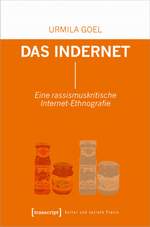Mittwoch, 8. März 2006
Intercultural
urmila, 00:20h
At the moment it is fashionable to deal with 'intercultural' issues. At our university you can study intercultural communication. Intercultural coaches are much demanded. If they are progressive, they do not only teach you that you should not blow your nose in 'Asia' and pay your fines in Germany.
But even if 'intercultural' seems progressive, then there is a bad taste to it. After all 'intercultural' means something like the contact between cultures. But that implies that there are fixed cultures and that these - and not individuals - meet. It is again an ascription, barriers are built, groups are homogenised.
But even if 'intercultural' seems progressive, then there is a bad taste to it. After all 'intercultural' means something like the contact between cultures. But that implies that there are fixed cultures and that these - and not individuals - meet. It is again an ascription, barriers are built, groups are homogenised.
0 Kommentare in: english ... comment ... link
Montag, 6. März 2006
Othering
urmila, 15:52h
In the German version of the blog I got a comment about the post Different or not?. The author of the comment argued that one should stop discussing the issue. One has to live with the fact that one is asked such questions in a 'foreign' country.
With this comment the author has illustrated quite well the situation of the 'Other Germans'. They constantly make the experience that people consider them 'foreigners' in the place they live. And they continue like the author of the comment to imply that they belong to some other place.
But this ignores the fact that in their supposed 'country of origin' they are much more 'foreigners' than in Gemany. They are socialised in Germany and know their way around there. In the so called 'country of origin' they are not familiar with the structures of society and everyday life. They are actually 'foreign' to it.
In Germany they are not 'foreign'. But they experience othering. As for example in the comment.
With this comment the author has illustrated quite well the situation of the 'Other Germans'. They constantly make the experience that people consider them 'foreigners' in the place they live. And they continue like the author of the comment to imply that they belong to some other place.
But this ignores the fact that in their supposed 'country of origin' they are much more 'foreigners' than in Gemany. They are socialised in Germany and know their way around there. In the so called 'country of origin' they are not familiar with the structures of society and everyday life. They are actually 'foreign' to it.
In Germany they are not 'foreign'. But they experience othering. As for example in the comment.
0 Kommentare in: english ... comment ... link
Montag, 6. März 2006
'Indians' celebrating carneval
urmila, 00:52h
A friend of mine lives in a small town in the carneval area. The local women's group dressed up as 'Indians' for the parade. They wore some 'Indian' garments and long black wigs. My friend was a bit disappointed by them not handing out cardamom and shouting Namaste. So she, who was dressed up as a lemon, greeted them with Namaste. Ohterwise she did not join them. She is 'Indian' most of the year anyway.
0 Kommentare in: english ... comment ... link
Samstag, 4. März 2006
Different or not?
urmila, 19:17h
The other day I went out with some friends. We talked about this and about that. I explained my research project and why I am fascinated by it. We were talking about the experience of othering and I mentioned my 'Indian' father. The friends were very surprised. They had not seen it.
Others do. Or think they do? Once an elderly women quite inquisitively demanded to know where I am from. I did not want to answer and tried many methods to avoid answering. But she kept on insisting. She would not be convinced that I am German and argued that my name, 'skin colour' and way of talking clearly marked me as a 'foreigner'. Since then I wonder when and how I adopted a foreign accent.
And I wonder how much of the others' ideas about me are really related to me.
Others do. Or think they do? Once an elderly women quite inquisitively demanded to know where I am from. I did not want to answer and tried many methods to avoid answering. But she kept on insisting. She would not be convinced that I am German and argued that my name, 'skin colour' and way of talking clearly marked me as a 'foreigner'. Since then I wonder when and how I adopted a foreign accent.
And I wonder how much of the others' ideas about me are really related to me.
0 Kommentare in: english ... comment ... link
Donnerstag, 2. März 2006
Racism and Islamophobia
urmila, 02:22h
In Bavaria there exists the tradition of giving political speeches on Ash Wednesday (the end of carnival, or something like that, not being a Christian I do not really know). The leader of the conservative Bavarian CSU Edmund Stoiber talked for two hours in front of beer drinking members of his party. The last quarter of his speech was dedicated to the issues of 'migration'. And they were very successful with the audience. No wonder as they catered for their racist and islamophobic sentiments. A little bit was there also for the homophobic ones.
Just one small translation as an example for the racist character of the speech. He obviously was not happy about Venor Muñoz inspecting the German school system, criticised it for being an incompetent inspection and ended with:
"This Mr. Muñoz came directly from the black african Botswana to Germany. I say very clearly: Do not mistake Germany for Botswana. And I add: Bavaria is not Botswana. To make this very clear!"
Just one small translation as an example for the racist character of the speech. He obviously was not happy about Venor Muñoz inspecting the German school system, criticised it for being an incompetent inspection and ended with:
"This Mr. Muñoz came directly from the black african Botswana to Germany. I say very clearly: Do not mistake Germany for Botswana. And I add: Bavaria is not Botswana. To make this very clear!"
0 Kommentare in: english ... comment ... link
Mittwoch, 1. März 2006
Dignity
urmila, 17:13h
The German constitution guarantees the dignity of men and women. But somehow this seems to apply only to certain men and women.
The European Committee for the Prevention of Torture and Inhuman or Degrading Treatment or Punishment of the Council of Europe has just criticised the conditions under which migrants without documents, who are to be deported, are detained in Germany.
And a local NGO criticises the conditions under which asylum seekers have to live in Brandenburg.
The dignity of asylum seekers and undocumented migrants in Germany is a matter of bureaucratic disposal.
The European Committee for the Prevention of Torture and Inhuman or Degrading Treatment or Punishment of the Council of Europe has just criticised the conditions under which migrants without documents, who are to be deported, are detained in Germany.
And a local NGO criticises the conditions under which asylum seekers have to live in Brandenburg.
The dignity of asylum seekers and undocumented migrants in Germany is a matter of bureaucratic disposal.
0 Kommentare in: english ... comment ... link
Dienstag, 28. Februar 2006
In the zoo
urmila, 19:24h
A short time ago I dined blind. An interesting experience to be in total darkness, not to see anything. I am happy to have my eyesight.
Before the diner begins you have to wait in the lounge. There I listened to a conversation. The others were quite exited about this upcoming experience. The most exciting aspect seemed to be that the waiters were blind. Real blind people! The more I listened to them the more I got the impression they were talking about some exotic species. Very irritating.
Unfortunately for them, however, they could not ganze at the waiters while they worked. There was no light.
Before the diner begins you have to wait in the lounge. There I listened to a conversation. The others were quite exited about this upcoming experience. The most exciting aspect seemed to be that the waiters were blind. Real blind people! The more I listened to them the more I got the impression they were talking about some exotic species. Very irritating.
Unfortunately for them, however, they could not ganze at the waiters while they worked. There was no light.
0 Kommentare in: english ... comment ... link
Montag, 27. Februar 2006
Differences
urmila, 23:10h
When a 'Muslim' woman wears a scarf, she is discriminated by her religion.
When terrorists claim to act in the name of 'Islam', then this it is the fault of 'Islam'.
When the income difference according to gender is in Germany one of the highest in Europe, then it is ... I do not know. Probably the women should not be so narrow minded. There are certainly some objective reasons for this.
When terrorists in Ireland claim to act in the name of 'Protestantism' or 'Catholicism', it has nothing to do with religion.
When terrorists claim to act in the name of 'Islam', then this it is the fault of 'Islam'.
When the income difference according to gender is in Germany one of the highest in Europe, then it is ... I do not know. Probably the women should not be so narrow minded. There are certainly some objective reasons for this.
When terrorists in Ireland claim to act in the name of 'Protestantism' or 'Catholicism', it has nothing to do with religion.
0 Kommentare in: english ... comment ... link
Sonntag, 26. Februar 2006
The culture of migrants
urmila, 15:08h
Here in Berlin we have a special kind of migrants, who try to impose their culture on 'us'. They have come from the Rhineland and brought some archaic customs with them. They dress up in weird liveries, consume a lot of alcohol, make sexist jokes and block the streets. Instead of integrating into 'our' society, they try to change 'us'. They claim that we lack humour, that we should relax more and join them in their merriment. And nobody stopps them, they are even allowed to parade in the streets. Fortunately, so far most of the Berliners resist all attempts to be carnevalised. But how long can 'we' withstand these imperialist migrants?
0 Kommentare in: english ... comment ... link
Samstag, 25. Februar 2006
Integration
urmila, 00:21h
The debate about migration and its consequences in Germany is dominated by the term 'integration'. The 'migrants' should 'integrate' themselves, should be 'integrated', have failed to 'integrate', etc. And I do not understand the importance or rather the adequateness of this concept 'integration'.
The people who are talked about have lived most of their lifes (if not all of it) in Germany. They are part of this society. And thus surely must be 'integrated'. They are part of the whole. Independent of the fact that many do not want to accept them as part of the society. Independent of the discriminations they have to live with.
There is a lot which needs to be done in order for all who live in Germany to get the same rights. But I just do not understand how the term and vague concept of 'integration' can help in this context.
The people who are talked about have lived most of their lifes (if not all of it) in Germany. They are part of this society. And thus surely must be 'integrated'. They are part of the whole. Independent of the fact that many do not want to accept them as part of the society. Independent of the discriminations they have to live with.
There is a lot which needs to be done in order for all who live in Germany to get the same rights. But I just do not understand how the term and vague concept of 'integration' can help in this context.
0 Kommentare in: english ... comment ... link
... nächste Seite
 Foto: © Anke Illing
Foto: © Anke Illing


